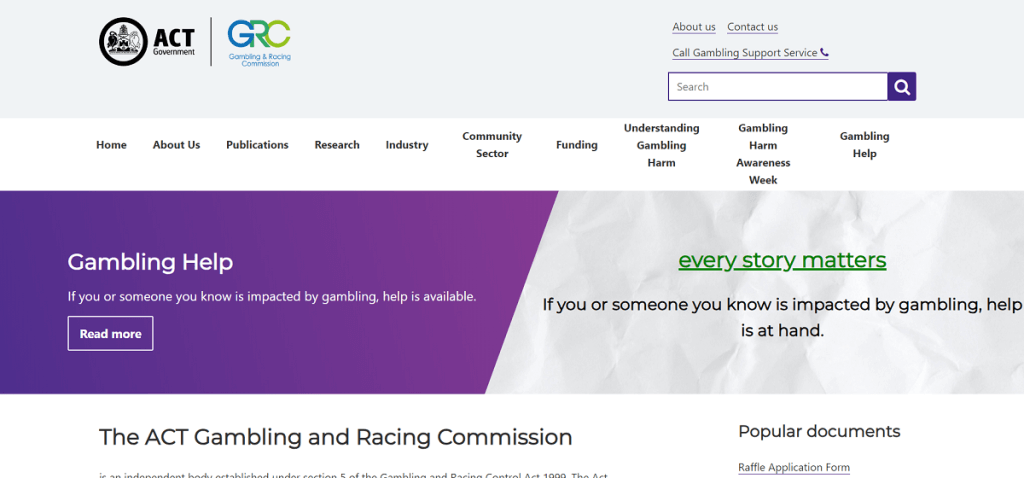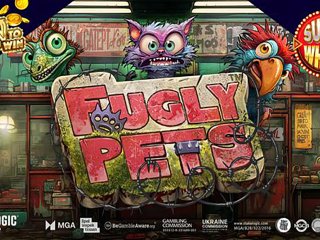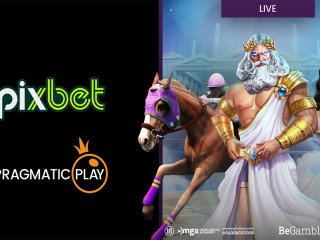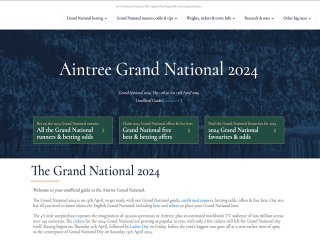
ACT Gambling and Racing Commission Review
By Alex Smith Feb 29, 2024
Casinomeister's Verdict
Sports betting is the only form of gambling allowed in Austrailia, and the ACT Gambling and Racing Commission oversees it with an iron fist. They don’t tolerate nonsense, and hold sports betting companies to the highest standard.

The regulatory in charge of overseeing gambling activity in Australia
 Pros
Pros
Well-meaning
Takes its license restrictions quite seriously
 Cons
Cons
Considerable amounts of controversy
Allowed sites to operate illegally despite knowing it was happening.
ACT Gambling and Racing Commission
Australian online gambling is no easy task to discuss, and what’s quite strange is that due to some relatively outdated and archaic laws, it’s not currently possible for Australian-based companies to offer online gambling services to Australian players. However, online gambling companies in Australia are allowed to exist, provided that they only provide their games and services to players located outside of Australia.
The ACT Gambling and Racing Commission is the regulatory in charge of overseeing gambling activity in Australia and it was first founded back in 1998 when the Interactive Gambling Act was passed; this act was brought in with the intention of allowing the country to move towards a more liberal stance on gambling – although, as we’ve just mentioned, it’s caused quite a lot of confusion, and hasn’t really enables Australian companies to keep up with the rest of the world.
While online casinos aren’t allowed to operate in Australia (if they themselves are located in the territory), online sports betting is allowed – and it’s the ACT Gambling and Racing Commission that’s in-charge of overseeing all types of sports betting, from horse racing to Aussie Rules football.
About The ACT Gambling and Racing Commission
As stated on their website:
“The ACT Gambling and Racing Commission (the Commission) is an independent body established under section 5 of the Gambling and Racing Control Act 1999. The Act provides for the continued administration of certain Acts relating to gambling and racing and establishes the powers, functions and activities of the Commission.
The functions of the Commission include:
- regulating the activities of the casino, gaming machines, lotteries, racing, betting and interactive gambling;
- approving gaming and racing activities;
- monitoring and researching the social effects of gambling and of problem gambling;
- reviewing legislation and policies relating to gaming and racing and making recommendations to the Minister on those matters;
- providing education and counseling services;
- investigating and conducting inquiries into issues and activities of persons in relation to gaming and racing related matters;
- monitoring, researching and funding activities relating to gaming and racing;
- engaging in community consultation, as appropriate; and
- collecting taxes, fees and charges imposed or authorized by or under gaming laws.
The Commission performs its functions in a way that best promotes the public interest, and in particular, as far as practicable:
- promotes consumer protection;
- minimises the possibility of the criminal or unethical activity; and
- reduces the risks and costs, to the community and individuals concerned, of problem gambling.
Vision and Values of the Commission
The vision of the Commission is to create an environment in which key stakeholders have the highest degree of confidence in the integrity of the Territory’s approved gaming and wagering industries, and to minimize the harm caused by problem gambling.
The Commission’s values are:
- fairness and integrity;
- achievement and excellence;
- innovation and development; and
- teamwork.”
Provisions of a License
ACT Gambling and Racing Commission attempt to make the process of applying for an online gambling license as easy as possible, and their fees are a lot lower than many other jurisdictions; however, it’s important to remember that online casinos and casino games aren’t legal, only sports betting is allowed online.
The cost of applying for a license is under $300 – so it’s affordable to virtually every bookmaker, even the small ones who are just starting out. Below, we look at some of the major things that operators are expected to adhere to when offering legal online gambling services to Australian citizens.
Anti Money-Laundering
One of the biggest roles of the ACT Gambling and Racing Commission is to make sure that the Australian Capital territory is protected against money-laundering – and this is enforced under the Anti-Money Laundering and Counter-Terrorism Financing Act, which was brought into force back in 2006. There’s also a plethora of other legislation that surround online gambling operators – and the main responsibilities include:
- Ensuring that all players and bettors are verified to a satisfactory level; this means that online gambling operators have to do their own due diligence on customers who create an account and deposit funds. This can include identity checks and source of wealth checks;
- All operators who’re taking real-money bets myst have robust anti-money laundering and counter-terrorism financing programmes in place – and these operators must be able to prove to the ACT Gambling and Racing Commission how they’re running these schemes. Spot-checks are conducted at random intervals.
- All operators must report regularly to the Australian Transaction Reports and Analysis Centre, which acts as the main body for enforcing all of the afore-mentiond anti-money laundering and counter-terrorism financing laws, any suspicious transactions; they must also provide them with compliance report and information about international fund transfers.
- All operators, accACT Gambling and Racing Commission, must keep all financial records, which includes the transactions made by players, details of electronic funds transfers, and information surrounding customer identification checks. They also need to keep information about their due diligence assessments.
Unsurprisingly, the penalties and potential fines for online gambling operators who breach these rules can be very harsh – and the ACT Gambling and Racing Commission lays out exactly what kinds of penalties operators can expect to face on their website. What’s more, the ACT Gambling and Racing Commission isn’t afraid of taking action, either – and there’ve been a few cases, including both online gambling and gambling in land-based casinos – where operators have been fined.
For example, in 2015, three Tabcorp Group companies were faced with legal action for ‘extensive, significant and systemic non-compliance’ with all of the anti-money laundering and counter-terrorism financiaing laws; after a lengthy two-year investigation, in 2017 the Australian Federal Court agreed to a settlement figure, which totalled a staggering $45 million.
Another case was brought in 2019 against Crown Resorts and some of its associates. The allegations brought against them included the fact that the company had knowingly engaged in money-laundering, and some reports stated that they even have direct links to organized crime. While the case is still on-going, it shows that the ACT Gambling and Racing Commission is unafraid of taking action and they work closely with law enforcement agencies to ensure that those who are breaking the rules are caught and penalized accordingly.
Prevention of Organized Crime and Match Fixing
In the past, match fixing has been a problematic occurrence in Australia; because of this, new laws and regulations have recently been passed in an attempt to crack down on it, and it’s now a criminal offense in most jurisdictions. As ‘The Law Reviews’ states:
“Under legislation in most Australian jurisdictions, wagering operators are required to enter into integrity agreements with each relevant racing controlling body and the leading sporting bodies on which they offer betting products.4 These agreements allow the operator to use the statistical information relating to the sporting or racing events (and participants) in return for a fee and on the condition that they agree to cooperate with these bodies by providing information about their customers’ betting patterns and behavior to assist in the investigation of match-fixing.
In August 2017, the federal Minister for Sports, the Honorable Greg Hunt, announced a review of Australia’s sports integrity arrangements to be led by the Honorable James Wood AO QC (Wood Review). As part of the federal government’s response to the recommendations that arose from the Wood Review, the Department of Health was given the responsibility of developing a federal regulatory framework for sports integrity. This is known as the Australian Sports Wagering Scheme (ASWS). The purpose of the ASWS is to safeguard the integrity of Australian sport and provide a sports integrity framework for sports wagering regulation at the federal level. It is anticipated that the ASWS will be operational in late 2021.”
Collecting Taxes
As is the case in pretty much every country on earth, all companies in Australia are required to pay corporation income tax – which is currently set high, at 30% – and there’s also a 10% sales tax on all sales. The ACT Gambling and Racing Commission is responsible for ensuring that additional taxes that are payable by gambling companies are paid in full, and on time – and it’s quite a complex issue for the ACT Gambling and Racing Commission, as there’s a number of different components that make up this process. For example, these taxes can include:
- Calculating the direct gambling taxes that are due as per the gambling revenue of the company; where things get confusing, is that different jurisdictions in Australia have different taxation rules when it comes to gambling – so the ACT Gambling and Racing Commission is responsible for ensuring that all gambling and racing companies are paying their fair share.
- Along with the various taxes the ACT Gambling and Racing Commission also ensures that license fees are paid by operators; like in most jurisdictions, the upfront cost of a license tends to be much higher than the monthly or yearly costs – and these fees are paid directly to the ACT Gambling and Racing Commission.
- While it’s not the case in all Australian states and territories, many do require gambling operators and companies to pay PoC Tax; this tax is a percentage of revenue that is directly derived from customers who are situated in the relevant jurisdiction, so again, it’s another tough task for the ACT Gambling and Racing Commission to keep track of.
Ensuring Legal Advertising & Marketing
Possibly one of the biggest tasks of the ACT Gambling and Racing Commission is to monitor advertising and marketing used by online gambling operators and land-based casinos, and while Australian laws surrounding gambling-based advertising tend to be pretty strict, there are some cases where it’s legal.
In fact, the Australian legal system when it comes to gambling-based advertising solutions varies greatly, with different states having different rules, and even different jurisdictions within states having different rules. The ACT Gambling and Racing Commission is primarily tasked with ensuring that online gambling operators and land-based casinos don’t breach any of the laws – laws that make it an offense to advertise:
- Encouraging citizens of Australia to break the law (for example, playing at an Australian-based unlicensed online casino.)
- Using imagery of children under the age of 18 – or adverts that the ACT Gambling and Racing Commission reasonably believes are designed to appeal to those who are aged 18 or below.
- That the chance of winning (whether it be a horse racing bet or the result of a casino game in a land-based casino) will be increased by participating in gambling activities.
- The promotion of drinking alcohol while gambling
- Among many others.
There are some very strict laws and regulations surrounding advertising in the gaming industry – and this goes for adverts in both conventional media, like print ads and TV and radio – along with PPC adverts and social media marketing.
A number of new rules and regulations have been passed in Australia, with one of the most notable being in 2017. The ACMA approved new regulatory codes that completely banned gambling adverts being played during the broadcast of commercial free-to-air TV, pay-TV and radio – and similar bans were also introduced for online advertising in other sectors.
In addition to these nation-wide regulations, some states have also brought in their own regulations. For example, the Victorian government brought in a law in 2018 that banned gambling adverts on public transport, along with any adverts that were located within 150 meters of a school; gambling adverts are also banned on public roads – including everything from billboards and banners, to moving video images and more.
Offshore Gambling Laws
The Interactive Gambling Act 2001 (Cth) (IGA) was passed by the federal government in 2001, prohibiting the establishment of ‘interactive’ (or online) gambling opportunities with an ‘Australian customer connection.’ The Australian Telecommunications and Information Authority (ACMA) and the Efcc are in charge of enforcing the IGA. The Internet Gaming Amendment Bill 2017 (Cth) (IGA Amendment Act) was passed in September 2017 in response to accusations that the current law was unsuccessful in discouraging unlicensed offshore gambling companies from offering services to Australian people.
The amendments tougher penalties, expanded existing abetting crimes, clarified the federal ban on certified gambling operators using VoIP technology to support in-play betting services, prohibited wagering operators from providing lines of credit, and gave the ACMA more crime investigation and enforcement powers, including the ability to issue official cautions and summonses.
In general, the IGA forbids the providing of ‘forbidden online gambling activities’ (the Section 15 Offense) and regulated online gambling services’ (the Section 15AA Offense) to people present in Australia without an Australian license (together, the Operational Prohibitions). Wagering services (with the exception of online in-play sports betting and betting on the result of lotteries, which are forbidden) and lottery services are among the regulated interactive gambling services (with the exception of online instant or scratch lotteries, which are also banned). Furthermore, the IGA forbids the promotion of ‘forbidden online gambling services’ and regulated interactive gambling services’ in Australia unless such relevant party is licensed in Australia (the Advertising Prohibition).
The IGA prohibits offshore operators from providing internet gambling to Australian people, but it does not ban Australian residents from visiting those overseas services or Australian operators from providing services to clients in other countries.
If the provider didn’t realize, and could not rationally have understood, that their product had a ‘Australian customer connection,’ that is, that some or all of the service’s clients were able to be present in Australia, there is a defense available.
A Large Crack-Down On Casinos Targeting Australians
In March of 2021 the Australian government – and the ACT Gambling and Racing Commission – made headlines when they failed to act upon regulatory bodies in the country who stated that online casinos illegally targeting Australian players weren’t being blocked as they were supposed to be. According to a report published by the Guardian, ten unlicensed online casinos were being marketed directly to Australian players – and two months after the Australian Communications and Media Authority told the newspaper that it was aware of the sites, they were still up and running and able to be accessed. Below, we’re going to post an excellent extract from the Guardian report, detailing some of the problem sites:
“Providing an unlicensed online gambling service to Australians is a crime that can attract a fine of up to $1.1m a day under the Interactive Gambling Act (IGA).
The sites are competing for a slice of a potentially very lucrative pie. Estimates of the revenue reaped by online gambling operators in the Asia-Pacific vary from about US$50bn ($65bn) to more than US$70bn ($90bn), and the popularity of betting on the web surged among Australians during last year’s coronavirus lockdowns, according to government research.
But investigating the casinos is made more difficult because they do not disclose their ownership and most shield the registration of their websites behind protection services offered by internet infrastructure company Cloudflare – used by nine of the 10 gambling sites examined by the Guardian.
A man who answered Two Up Casino’s Australian phone number said the casino was located in Curaçao.
He said Australian customers were welcome.
“Yes, we do have a license in Australia,” he said. “We have a lot of players around the world.”
He said he was not allowed to supply details of the license over the telephone.
None of the 10 casinos responded to questions emailed to contact addresses listed on their websites. A marketing firm who has been listed as a contact on press releases issued by Fair Go Casino and PlayCroco did not respond to questions sent by email and social media messaging.
The identity or identities of the providers of the poker machine-style games offered by the websites is also unclear.
All 10 appear to offer a range of colorful animated games that are marketed online under the brands Real Time Gaming and Spinlogic Gaming.
In a press release issued in June last year, PlayCroco advertised itself as offering a game called Wild Hog Luau, where rather than being the pig on a spit at a Hawaiian celebration “players join a group of hogs as they dance the night away on a tropical beach”, and Real Time Gaming was identified as the producer.
Real Time Gaming’s logo also appeared on the website of two of the 10 sites reviewed by the Guardian, BoVegas and Red Dog Casino.
The Real Time Gaming brand has been linked to Isle of Man-registered company Endon Technologies apparently by one of Endon’s directors. In an interview published in Casino Life magazine in September, the director was quoted saying that “Real Time Gaming is and always has been a brand, not a company” and that “Endon as an entity has a license to provide RTG branded content to 3rd party B2B or B2C operators”.
Hong Kong-based RTG Slots, which markets games including Wild Hog Luau, also claims on its website to be “the Asia-focused and facing trading name of Endon Technologies based in the Isle of Man”, and the RTG Slots logo also appears on Endon’s own website.
The director did not respond to Guardian Australia’s request for comment. A second Endon director, Tina Rawlinson, firmly denied that Endon had any links or supplier relationship with the 10 casinos and told Guardian Australia that “RTG is not a trading name of Endon Technologies Limited”.
“I will ask for the wording in the RTG Slots website to be corrected,” she said. “Similarities in brand abbreviations cannot always be avoided.”
Endon “has no relationship with Spinlogic”, she said.
Provided with the names of the 10 casinos reviewed by the Guardian, she said: “I confirm that none of the casinos you have highlighted are operated by clients of Endon Technologies Limited.
“As we have established that Endon Technologies Limited is not involved in the provision of games or software to any of the 10 casinos under your spotlight, there can be no purpose to communicate further, save for to comment that it would be legally incorrect (and potentially libelous) to make any public reference that suggested Endon Technologies Limited is connected with said 10 casinos.”
Disputes and Player Complaints
The ACT Gambling and Racing Commission has a rigorous complaints procedure in place which is designed to protect players at all stages of their online gambling journey – and below, we’re going to show you what the ACT Gambling and Racing Commission has to say about complaints and disputes.
“Under section 31 of the Gambling and Racing Control Act 1999, a person may lodge a complaint with the Commission about compliance with a gaming law within the ACT.
If your complaint relates to an incident involving the provision of a gambling service by a gambling service provider, we encourage you to resolve the matter with staff or management of the gambling service provider involved. However if you feel that this approach has not been successful then contact the Commission.
A complaint may be lodged with the Commission at https://www.accesscanberra.act.gov.au/s/feedback-and-complaints
Please ensure that you provide the Commission with a full and detailed account of the incident or problem along with your full contact details so that we can contact you if additional information is required.
At the time your complaint is received, it will be assessed by the Commission to ensure that it is about compliance with a gaming law and our staff will endeavor to respond to your complaint within 5 working days.
Matters that the Commission will investigate include complaints into any form of gambling compliance in relation to
- Gaming Machines
- Casino Canberra
- ACTTAB Wagering
- ACT Licensed Bookmakers
- Bingo
- Lotteries / Raffles
- Keno
The Commission however will not investigate complaints that are in relation to customer service at gambling venues, behavioral (including disciplinary matters) that are decided under a Club’s constitution and patron access to a venue’s security or surveillance systems.
Complaints that are within the Commission’s jurisdiction will be fairly and independently investigated by the Commission and wherever possible the Commission will advise the complainant about the result of the investigation.
Betting Disputes
Specific legislative provisions apply to disputes in relation to the underpayment or non-payment of winnings for bets made with an ACT licensed Bookmaker. The dispute is to be referred to the Commission within 28 days of the completion of the event on which the bet was made using the Betting Dispute form.
The Commission must give a written direction about the dispute as soon as practicable.”
From what we’ve been able to gather, the ACT Gambling and Racing Commission is very responsive to player complaints – and they actually take action against licensees who are found to be in breach of the terms and conditions of their license. This is good news, as it ensures that all online gambling sites in the Australian capital territory are fully-regulated – and, in the public interest, any major disputes that are found in favor of the player are often published on the ACT Gambling and Racing Commission’s website.
History of Gambling in Australia
Australia has a long history of gambling, and it’s been legal on a federal level since 1810. In fact, 1810 was the year that horse racing first became legal – and this was when the first horse racing track officially opened. While certain acts (bets) weren’t allowed, it paved the way for the legalization of gambling throughout the country – and below we’re going to take a brief look at the history of gambling in Australia.
In the 1850s, horse racing became even more popular – and virtually all major cities in the country had their own horse racing track by this point. They were known as hippodromes, and going to the horse races and placing bets on horses was a popular past-time with the middle and upper classes. Indeed, this tradition of betting on horse races still takes place today – and Australia is renowned for its horse racing tracks.
In the late 1880s Australia legalized lottery games – and this included both private lotteries as well as raffles. This was a fairly major turning point in the world of land-based gambling in Australia as it was the first time that gambling was really opened up to the lower classes; those with little money to spend could now enjoy a wager on exciting games of chance.
In 1916, a notable year, the first Golden Casket Lottery was held – and this went on to become the official lottery of Queensland. Lotteries proved incredibly popular with players, and before long, private lotteries had started to appear; as a result of this, the government decided to outlaw them, and lotteries soon became a monopoly of the localized state governments.
It wasn’t until 1956 that the first gambling machines started to make their way onto the scene, and it was the Clubman poker machine – a console developed by the still-producing-games-today game developer, Ainsworth. In 1973 land-based casinos were legalized in Australia, and the first license – although before the ACT Gambling and Racing Commission was founded – was issued to the Wrest Point Hotel Casino, located in Tasmania. Since then, the ACT Gambling and Racing Commission has taken charge of regulating land-based casinos and online sports betting in the country – and while they’re an independent body, the government does have a fair degree of influence over them.
Pros and Cons
The ACT Gambling and Racing Commission is a well-meaning organization – but their failure to protect Australians has led to considerable amounts of controversy. For example, as we saw from the Guardian’s report, despite the fact that the ACT Gambling and Racing Commission knew about a number of sites that were operating illegally, they still continued to allow them to operate – and it’s no surprise that the ACT Gambling and Racing Commission came under intense fire for this.
However, the ACT Gambling and Racing Commission does appear to take its license restrictions quite seriously – and when it comes to Australian-based operators doing wrong, they do appear to take their role fairly seriously.
Contact Details
Address: ACT Gambling & Racing Commission, Access Canberra, GPO Box 158, Canberra ACT 2601
Phone: (02) 6207 0359
Email: Online Enquiry Form
Website: https://www.gamblingandracing.act.gov.au
FAQs
What does the ACT Gambling and Racing Commission do?
The ACT Gambling and Racing Commission was created to regulate offline gambling in Australia (for example, gambling that takes place in land-based casinos and lotteries), and, in recent years, it’s been tasked with regulating legalized sportsbooks online. While online gambling isn’t really legal right now in Australia, things are slowly starting to change, and the ACT Gambling and Racing Commission has hinted that it may look to consider whether or not legalizing online casinos and allowing casino table games, video slots, live dealer games and more to be offered to players, may be beneficial.
The ACT Gambling and Racing Commission is responsible for issuing gaming licenses, both to land-based casinos and bookmakers – and while they’re not the best-known regulator in the world, they have a fairly solid reputation within the online gambling industry as they don’t mess around and have no qualms in dishing out fines where applicable and revoking licenses where necessary.
Is the ACT Gambling and Racing Commission an independent body?
Yes; the independent body, established some time ago, was designed to be just that – an independent body. It was designed to be an independent body so that it was free from government control – but in reality, certain acts from the government are able to exert significant amounts of control over the ACT Gambling and Racing Commission, so it’s not really fair to say that they’re completely independent.
Still, the ACT Gambling and Racing Commission has shown that it doesn’t bow to pressure, and while the independent body has generated valid criticism, they do, on the whole, appear to do a fairly good job in regulating land-based casinos and sports betting online.
Can Australians legally bet at online casinos located outside of the country?
Yes. While the ACT Gambling and Racing Commission (and even many government figures) in the country will try to scare Australians into thinking that gambling online is illegal, it’s important to note that Australians themselves can’t get in trouble for gambling at a casino if it’s located outside of the country. Only the online casinos and online gambling operators can get in trouble – but provided they’re not located in Australia it’s virtually impossible for the government or the ACT Gambling and Racing Commission to take any meaningful action against the sites, bar blocking the websites from loading – which they have tried.
However, you do need to be careful; while there are some legitimate online casinos that accept Australian players, as we saw from the Guardian’s news report earlier, some Curacao-licensed online casinos do claim to be licensed by the ACT Gambling and Racing Commission – which of course isn’t true – and these sites are likely going to try to take advantage of players – so if you’re looking for safe and reputable online casinos that accept Australian players make sure to check out the sites shown here on this page.
Are game developers allowed to be based in Australia?
Yes; the ACT Gambling and Racing Commission allows game developers and software providers to base themselves in Australia provided that they aren’t directly delivering their games illegally. However, Australian game developers and software providers are allowed to offer their games to other jurisdictions.
There’s a couple of notable online gambling software providers that are based in Australia; the first is Big Time Gaming, the pioneer of the Megaways mechanic and the game developer behind world-leading video slots like Bonanza and Danger High Voltage. Another name you may recognise is Eyecon, a smaller software provider who tend to focus on building low variance games for bingo sites.
These game developers and software providers do not need to be licensed by the ACT Gambling and Racing Commission, although they do need to hold a valid online gambling license in the jurisdictions where they want to offer their games.
Will online gambling be legalized in the future in Australia?
This is, of course, a subjective question as no one really knows; however, if we look at other countries (the United States being a prime example), it appears as though countries are starting to become more accepting towards online gambling – and in some cases, they simply don’t have much choice.
For example, with the rise of cryptocurrency casinos, it’s become virtually impossible for regulators like the ACT Gambling and Racing Commission to really stop players from playing at crypto casinos – and there’s many arguments for legalization to prevent players turning to the black market sites.
It was a major breakthrough when online sports betting was first legalized in Australia, and we’d say it’s fairly likely that things will change in the future. However, there’s no date on when this may happen – and it may be a number of years before the government and the ACT Gambling and Racing Commission can decide upon what they want to do in terms of legalizing online casinos and online casino games.
Where can I find the best online casinos that accept Australians?
If you’re looking for reputable online casinos that do accept Australian players then it’s worth noting that you won’t find anything of use at ACT Gambling and Racing Commission; and, if a site claims that they hold an online gambling license from the ACT Gambling and Racing Commission you should run away fast; there’s no such thing.
However, as mentioned earlier it’s perfectly legal for Australians to gamble at online casinos that are located outside of the country – and if you’re looking for the best online casinos that accept players then you’re in the right place here at Casinomeister.
Our team of online gambling experts work 24 hours a day, 7 days a week to bring you the best online casinos – and all of the sites listed here on our site have been hand-picked, tested and vetted by our team of experts.
At the top of this page you’ll be able to view a breakdown of the top online casinos that currently accept Australian players. You’ll also be able to view a breakdown of the current bonuses and promotions available at those sites – and if you see a site that you like the look of just hit the ‘play now’ button and you’ll be taken directly to the casino’s sign-up page!
 Top 5 casinos
Top 5 casinos 



















